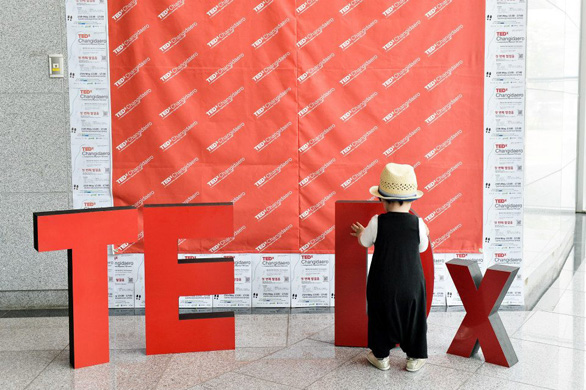
Building blocks: An adorable image from TEDxChangidaero in Changwon, South Korea.
TEDx and TED Fellows joined forces to bring Morocco its first hackerspace — “Sahara Labs,” a place for people of all ages to play with DIY engineering. The brainchild of TEDxTarfaya organizer El Wali El Alaoui Mohamed El Mostapha. He decided to bring this enterprise to his city because of the lack of education opportunities for children and youth in the area. At Sahara Labs, participants work together and build with littleBits so students of all ages can prototype and learn.
This is the power of a single TEDx event — the capacity to organically transform a community. From TEDx events held around the world, the TEDx team chooses four favorite talks each week, highlighting just a few of the enlightening speakers from the community and its diverse constellation of ideas. Below, listen to this week’s talks — on topics ranging from ocean earthquakes to the cause of schizophrenia.
Seafloor earthquakes: Maya Tolstoy at TEDxCERN
As a graduate student, Maya Tolstoy and her team confirmed the long-suspected hypothesis that Earth’s tidal forces affect the speed by which underwater earthquakes gain power. Today, Tolstoy explains how data from tidally-influenced undersea tremors could be used to predict and plan for large-scale, highly destructive earthquakes and tsunamis. (Filmed at TEDxCERN.)
The human footprint in space: Alice Gorman at TEDxSydney
From Earth’s orbit to the surface of Venus to the outer reaches of the solar system, artifacts of our civilization lie far beyond the ground we walk on. Alice Gorman takes us on a virtual tour of the footprints (literal and otherwise) that humans have left behind in 60 years of space exploration. (Filmed at TEDxSydney.)
The genetic causes of schizophrenia: David Collier at TEDxKingsCollegeLondon
Although there is still much to learn about schizophrenia, recent advances in medical technology have allowed scientists to make great leaps in the understanding of the causes and treatment of the disorder. Geneticist David Collier gives insight into some of these technologies, including one that allows scientists to study millions of genetic variations in one individual with one single experiment. (Filmed at TEDxKingsCollegeLondon.)
The language of chimpanzees: Katie Slocombe at TEDxHull
Can studying chimps unlock the keys to our languages? At TEDxHull, evolutionary psychologist Katie Slocombe shows the linguistic differences between how chimpanzees react to different types of food, from mild reactions to apples to wild hoots when given bread — findings that may help us understand human evolution and the cognitive abilities of our ancient human ancestors. (Filmed at TEDxHull.)
Below, some highlights from the TEDx blog this week:
Comments (1)